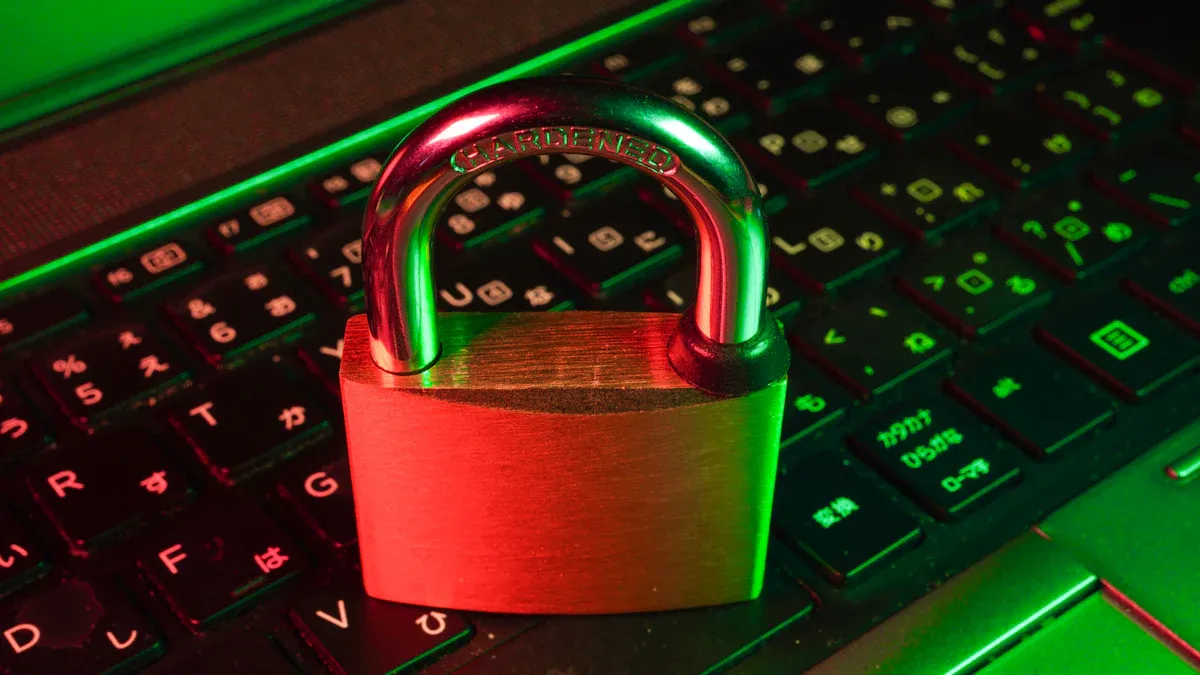What Is the Term for the Confidential Code That Gives Access to and Control Over a Crypto Wallet?
2025-11-04 00:00:00
A private key, which is the term for the confidential code that gives access to and control over a crypto wallet, serves as a digital key that unlocks a user's cryptocurrency. It provides complete control over the wallet, making it an essential security element. Losing this confidential code means losing access to funds permanently. In 2024, 43.8% of stolen cryptocurrency resulted from private key compromises, highlighting its vital importance in safeguarding assets.
What Is a Private Key in Cryptocurrency?

Definition and Purpose of a Private Key
A private key is a unique string of characters that acts as the cornerstone of cryptocurrency security. It is part of a cryptographic system that allows users to sign transactions and prove ownership of their digital assets. Think of it as the digital equivalent of a physical key—it unlocks access to your funds and ensures only you can authorize their use. Without this key, accessing your crypto wallet or managing your assets becomes impossible.
Private keys are automatically generated by digital systems, ensuring they are both unique and unpredictable. This randomness is critical for security, as it makes it nearly impossible for unauthorized parties to guess or replicate the key. However, the importance of managing private keys carefully cannot be overstated. If a private key is lost or stolen, the associated funds are irretrievably compromised. This highlights the need for robust key management practices, such as secure storage and regular backups.
How Private Keys Relate to a Crypto Wallet
A crypto wallet is essentially a tool that stores and manages private keys. While the wallet itself doesn’t hold cryptocurrency, it provides the interface needed to access and control digital assets stored on the blockchain. The private key is what connects the wallet to the blockchain, enabling users to send and receive funds securely.
To better understand this relationship, consider how Bitcoin transactions work. When a user initiates a transaction, the private key generates a digital signature. This signature verifies the transaction’s authenticity and ensures it hasn’t been tampered with. Without the private key, the wallet cannot create this signature, making transactions impossible.
Interestingly, many Bitcoin users possess multiple private keys to enhance security. Research on Bitcoin transaction graphs has shown that users often distribute their funds across different keys. This practice minimizes risk, as compromising one key doesn’t grant access to all assets. Public datasets have been instrumental in studying these patterns, shedding light on how private keys are used to secure funds effectively.
Private Keys and Their Role in Bitcoin and Other Cryptocurrencies
Private keys play a pivotal role in Bitcoin and other cryptocurrencies by enabling secure transactions and protecting ownership. In the Bitcoin network, every transaction relies on a pair of keys: a private key and a public key. The private key remains confidential, while the public key is shared openly. Together, they form the backbone of Bitcoin’s cryptographic security.
Here’s how it works:
- The private key generates a corresponding public key through a mathematical process.
- The public key is then used to create a Bitcoin address, which serves as the destination for receiving funds.
- When sending Bitcoin, the private key signs the transaction, proving the sender’s ownership and authorization.
This system ensures that only the private key holder can access the funds associated with a specific Bitcoin address. The same principle applies to other cryptocurrencies, making private keys a universal security mechanism in the crypto world.
The length and randomness of private keys are also crucial for their effectiveness. Experts recommend a minimum length of 2,048 bits to protect against brute-force attacks. High randomness in key generation further enhances security, making it nearly impossible for hackers to predict or replicate the key. These features underscore why private keys are indispensable for safeguarding digital assets.
Tip: Always keep your private key secure. Consider using a hardware wallet or a secret recovery phrase to protect your funds from unauthorized access.
Why Are Private Keys Critical for Security?
Protecting Ownership of Cryptocurrency
Private keys are the backbone of cryptocurrency ownership. They act as proof that a user has control over their digital assets. Without them, no one can access or transfer funds stored in a crypto wallet. This makes private keys essential for maintaining ownership and ensuring that only the rightful owner can manage their assets.
Unfortunately, the stakes are high when it comes to private key security. In 2025, $2.3 billion worth of cryptocurrency was stolen due to compromised keys. Shockingly, only 3% of users had implemented two-factor authentication, leaving their wallets vulnerable to attacks. These statistics highlight the importance of safeguarding private keys to protect ownership and prevent unauthorized access.
To further illustrate the risks, here’s a table of major security breaches caused by compromised keys:
| Incident | Loss Amount |
|---|---|
| Bybit Hack | $1.5 billion |
| Phemex Hack | $85 million |
| Infini Hack | $50 million |
These incidents emphasize the need for robust security measures. Using a secret recovery phrase or a hardware wallet can provide an additional layer of protection, ensuring that private keys remain secure.
Preventing Unauthorized Access to a Crypto Wallet
Private keys serve as a gatekeeper, preventing unauthorized access to a crypto wallet. Without the correct key, no one can access the funds or initiate transactions. This cryptographic barrier ensures that even if someone gains access to the wallet interface, they cannot control the assets without the private key.
However, security vulnerabilities can arise if users fail to store their keys securely. For instance, storing private keys on an internet-connected device increases the risk of hacking. Cybercriminals often exploit these vulnerabilities to steal digital assets. To mitigate these risks, users should consider offline storage options, such as hardware wallets, which keep private keys disconnected from the internet.
Another effective strategy is to use a secret recovery phrase. This phrase acts as a backup for the private key, allowing users to regain access to their wallet if the original key is lost. By combining these methods, users can significantly reduce the risk of unauthorized access and protect their digital assets.
The Irreversible Nature of Cryptocurrency Transactions
One of the defining features of cryptocurrency is the irreversible nature of its transactions. Once a transaction is confirmed on the blockchain, it cannot be undone. While this ensures transparency and trust in the system, it also means that mistakes or unauthorized transactions can have permanent consequences.
Private keys play a crucial role in this context. They are required to sign transactions, proving that the sender has authorized the transfer of funds. Without the private key, no transaction can occur. This system prevents fraud and ensures that only the rightful owner can initiate bitcoin transactions.
However, the irreversible nature of blockchain transactions also highlights the importance of private key security. If a key is stolen or exposed, the thief can use it to authorize transactions, and the funds will be lost forever. There is no central authority to reverse the transaction or recover the assets. This makes private key protection a top priority for anyone involved in cryptocurrency.
Tip: Always back up your private key and recovery phrase in a secure location. Consider using a hardware wallet for added security and peace of mind.
How Do Private Keys Work?
The Relationship Between Private Keys and Public Keys
Private keys and public keys work together to secure cryptocurrency transactions. They form a cryptographic pair, each with a unique role. The private key acts as a secret password, known only to the wallet owner, while the public key serves as a digital address for receiving funds. This relationship ensures that only the private key holder can authorize transactions, providing robust protection for digital assets.
Here’s a quick breakdown of their functions:
- The public key encrypts messages and receives cryptocurrency.
- The private key decrypts messages and authorizes transactions.
- Together, they maintain the security and privacy of crypto wallets.
| Key Type | Definition | Functionality |
|---|---|---|
| Public Key | A key derived from a private key using a one-way mathematical function. | Used to receive cryptocurrency and encrypt messages. |
| Private Key | A secret key known only to the owner. | Used to decrypt messages and authorize transactions, ensuring security of the wallet. |
This one-way relationship ensures that even if someone knows the public key, they cannot derive the private key. It’s a critical feature that keeps bitcoin transactions secure.
Cryptographic Principles Behind Private Keys
The cryptographic principles behind private keys rely on advanced mathematics. Bitcoin and other cryptocurrencies use asymmetric encryption, where the private key generates the public key through a one-way function. This process ensures that the private key remains confidential while the public key can be shared openly.
The strength of this system lies in its randomness and complexity. Private keys are long strings of characters, often 256 bits in length, making them nearly impossible to guess. This randomness is essential for protecting crypto wallets from brute-force attacks. Additionally, the blockchain records all transactions, ensuring transparency while relying on cryptographic principles to maintain security.
How Private Keys Enable Secure Cryptocurrency Transactions
Private keys are the backbone of secure cryptocurrency transactions. When a user initiates a transaction, the private key creates a digital signature. This signature proves the transaction’s authenticity and confirms that the sender owns the funds. Without the private key, no transaction can occur.
For example, in bitcoin mining, miners validate transactions by solving complex mathematical problems. These transactions are then added to the blockchain. The private key ensures that only the rightful owner can authorize the transfer of funds, preventing fraud or unauthorized access.
Tip: Always store your private key securely. Consider using a hardware wallet or a secret recovery phrase for added protection.
Best Practices for Managing Private Keys

Choosing a Secure Crypto Wallet
Selecting the right crypto wallet is the first step in protecting private keys. A secure wallet acts as a fortress for your digital assets. Users should prioritize wallets with strong encryption and multi-factor authentication. These features add layers of protection, making it harder for hackers to gain access. Wallets that allow users to control their private keys directly are often the safest choice. For example, non-custodial wallets ensure that only the owner has access to the keys, reducing the risk of third-party breaches.
Backing Up and Recovering Private Keys
Backing up private keys is essential for avoiding permanent loss of funds. A reliable backup system ensures quick recovery in emergencies, such as device theft or failure. Experts recommend storing backups in multiple secure locations, like a fireproof safe or a safety deposit box. Using a secret recovery phrase is another effective strategy. This phrase acts as a backup for the private key, allowing users to restore their crypto wallet if the original key is lost. Regularly testing recovery methods can also help ensure they work when needed.
Avoiding Sharing or Exposing Private Keys
Private keys should never be shared or exposed. Treat them like the PIN to your bank account—keep them confidential. Sharing keys, even with trusted individuals, increases the risk of unauthorized access. Storing keys on internet-connected devices is another common mistake. Cybercriminals often exploit these vulnerabilities to steal bitcoin and other digital assets. Offline storage methods, such as hardware wallets, provide a safer alternative. Always remember, if someone gains access to your private key, they gain control over your funds.
Using Hardware Wallets for Enhanced Security
Hardware wallets offer one of the most secure ways to store private keys. These devices keep keys offline, away from potential online threats. Unlike software wallets, hardware wallets are immune to malware attacks. They also require physical confirmation for transactions, adding an extra layer of security. Popular hardware wallets, like Ledger and Trezor, are designed to protect bitcoin and other cryptocurrencies. By using a hardware wallet, users can safeguard their private keys and enjoy peace of mind.
Tip: Regularly update your hardware wallet’s firmware to ensure it stays protected against new threats.
Private keys are the backbone of cryptocurrency security. They ensure users can access and control their digital assets. Understanding cryptocurrency and blockchain technology helps users protect their funds. By following best practices, anyone can confidently buy and sell cryptocurrencies while enjoying the benefits of this innovative financial system.
FAQ
What happens if you lose your private key?
Losing a private key means losing access to your cryptocurrency. Without it, you cannot recover your funds or access your wallet. Always back it up securely.
Can private keys be hacked?
Private keys are highly secure due to their cryptographic design. However, poor storage practices or malware can expose them. Use hardware wallets to minimize risks.
How does decentralization affect private key security?
Decentralization ensures no central authority controls private keys. This enhances security but places full responsibility on users to protect their keys.